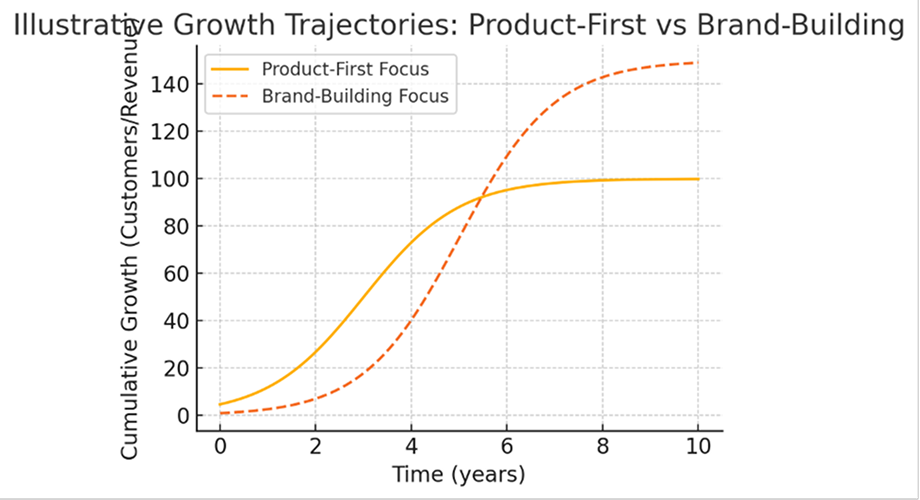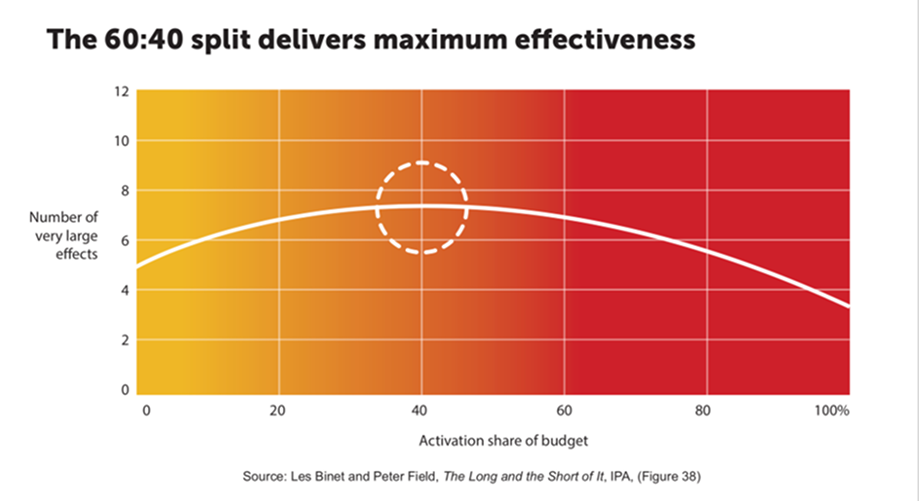
Introduction: The Prevailing Belief in Product Supremacy
In the dynamic world of startups, a common conviction prevails: prioritize product development above all else. Many founders initially believe an exceptional product alone will naturally attract customers, rendering brand building a secondary endeavor.
However, strategic experience shows that neglecting brand strategy early on can risk long-term potential. Indeed, surveys indicate nearly two-thirds of CMOs still favor product promotion over brand building, underscoring the pervasive yet problematic nature of the product-first dogma. My partner Misha Cherniak , Chief Strategic Officer Concepto , notes that "Founders often underestimate how integral brand strategy is to sustained success, mistakenly relegating it to an afterthought."
Evidence Contradicting the Product-First Mindset
Contrary to this prevalent belief, empirical evidence underscores the critical role of brand building in achieving sustainable growth. Research conducted by the Ehrenberg-Bass Institute shows that brands which remain under-advertised for multiple years are likely to lose market share. In other words, going "dark" on advertising and brand investment has measurable negative effects that a great product alone cannot counter. Les Binet and Peter Field's landmark analyses further demonstrate that marketing strategies focusing solely on short-term sales activation, without investment in long-term brand building, tend to underperform in profitability and growth. In their study of hundreds of campaigns, the companies that balanced activation with brand-building were far more likely to see strong revenue, profit and margin improvements. By contrast, an overemphasis on quick wins often yields only transient bumps that fizzle out, sacrificing long-term momentum for short-term gains.
Real-world outcomes echo these findings. Airbnb, for example, famously slashed its performance marketing budget and doubled down on brand marketing and PR in 2021 – a radical move in a tech industry that had long credited growth to product-led strategies. The result? By 2022, Airbnb saw its most profitable fourth quarter ever, as direct bookings surged and customer retention improved. Nearly 90% of its traffic now comes directly, rather than through paid channels, a shift the CFO called "incredibly effective". Far from hurting growth, the brand-focused approach boosted Airbnb's efficiency and helped deliver a full-year profit for the first time. This is no anomaly: even giants like Adidas and eBay have publicly admitted they became over-reliant on performance ads and are now rebalancing toward brand-building.
Many startups are following suit. In the San Francisco Bay Area, billboards for companies like Notion, Brex, and Slack became common just a year or two after launch – a telling sign that even product-led firms recognize the need to build a presence beyond the product itself. Startups that achieved dramatic initial growth only to plateau and fade often discover that product excellence couldn't save them from competitors who understood the emotional territories their brands needed to own in consumers' minds. Conversely, category leaders like Airbnb or Stripe pair product excellence with equally powerful brand narratives that transcend functional benefits.

Illustrative difference in growth trajectories: A startup focusing only on product features (solid line) may see early growth plateau once early adopters are exhausted. In contrast, a startup that invests in brand-building (dashed line) achieves more sustained growth, as a strong brand keeps attracting and retaining customers beyond the initial user base.
The evidence is clear: when startups neglect brand building, they surrender their most powerful weapon for sustainable differentiation. Brand investment isn't a cosmetic expense; it's directly linked to durable market share. In fact, recent industry data shows a notable shift in mindset. Almost four in ten marketers in 2024 say their company's strategy is now focused on brand marketing – a dramatic jump from just 14% in 2022. This rising commitment to brand reflects a growing realization that the product-first paradigm is incomplete at best, and dangerous at worst. Misha Cherniak of Concepto explains, "Brands that succeed sustainably are those that own unique emotional territories in the consumer's mind, not just functional benefits."
Scientific Insights into the Power of Brand Building
Delving deeper into marketing science, Professor Byron Sharp of the Ehrenberg-Bass Institute emphasizes the importance of "mental availability" — the ease with which a brand comes to mind when consumers are in a buying situation. Sharp defines a brand's mental availability as "the probability that a buyer will notice, recognize and/or think of a brand in buying situations," which depends on the memory structures associated with that brand. His research indicates that building and maintaining this mental availability is crucial for brand growth, as it directly influences consumer choice. Neglecting brand-building efforts will lead to diminished mental availability, making even superior products less likely to be considered by potential customers. Put simply, if your brand doesn't come to mind, it effectively doesn't exist at the moment of purchase. Studies of advertising "go dark" scenarios illustrate this vividly: brands that stopped advertising for a year or more saw steady declines in sales, forfeiting the memory connections that keep them in the consumer's consideration set.
Les Binet and Peter Field offer prescriptive guidance on balancing short-term and long-term marketing. They famously propose a 60:40 rule, suggesting that optimal marketing effectiveness is achieved by allocating roughly 60% of resources to long-term brand building and 40% to short-term sales activation. This split emerged from analysis of over 600 brands and has been found to maximize "very large" business effects (like substantial sales and profit growth) over time. Deviating too far from this balance – for instance, pouring 80%+ into performance ads – tends to produce diminishing returns.
This balance between immediate results and long-term brand equity is something we at Concepto have built into our strategic framework. When developing brand strategies for clients across multiple industries – from fintech and healthcare to e-commerce and SaaS – we consistently find that investment in both mental and physical availability creates sustainable competitive advantage. Our work typically begins with establishing strong brand foundations through comprehensive brand passports and strategically sound positioning before layering in tactical activation.

The neurological basis for these findings is compelling. Our brains process brand signals differently than product features — brand associations operate at both conscious and subconscious levels, creating mental shortcuts (heuristics) that can bypass deliberative rational thinking. When startups focus exclusively on product specifications, they're appealing only to the analytical, System 2 brain processes. Strong brands, however, engage the fast, intuitive System 1: the emotional centers of the brain that drive the majority of decision-making in practice. Neuroscientists have shown that when consumers have an emotional attachment to a brand, it literally changes how their brain evaluates options.
In one famous fMRI experiment, Coca-Cola and Pepsi triggered similar reward center activation in blind taste tests – but when participants knew they were drinking Coke, the brand's cultural associations lit up additional areas of the brain related to emotion and memory, tipping their stated preferences toward Coca-Cola. The emotional branding "hijacked" the rational taste comparison. This insight reinforces the power of brand loyalty and emotional cues: strong brands create memory structures and feelings that ensure the brand surfaces first (and favorably) during purchase decisions. It's not manipulative psychology—it's recognizing that humans make decisions through both rational and emotional pathways. A startup that ignores this reality is essentially competing with one hand tied behind its back, forcing consumers to judge it only on specs and price (a recipe for becoming a commodity). As Nobel laureate Daniel Kahneman noted, "people largely use their memories when buying, rather than searching," and what they remember (often unconsciously) are the brands that have built mental availability and positive sentiment over time.
The Indispensable Role of Brand in Startup Success
The notion that product excellence alone guarantees success is a misconception that can hinder a startup's true potential. Scientific research and real-world examples illustrate that brand building is not a romantic or "fluffy" pursuit, but a fundamental component of business strategy. A robust brand enhances mental availability, fosters customer loyalty, and provides a competitive edge that transcends the intrinsic qualities of the product. For startups aiming for sustainable growth and market presence, integrating brand development into their core strategy is not optional — it is imperative.
This imperative intensifies in competitive categories. When multiple players offer similar functionality — think payment processors, project management tools, or food delivery apps — brand becomes the decisive battleground. Features reach parity faster than ever, and any technical lead a startup has is often short-lived. The startup with superior brand recognition and emotional resonance will capture disproportionate market share, regardless of marginal product differences. In fact, as technology enables faster feature copying across competitors, brand differentiation becomes an even more critical and sustainable moat. Industry experts bluntly note that in markets where offerings are alike, "branding is the only reliable way to differentiate". It's the brand's story, values, and emotional connection that elevate one company above the rest in the eyes of customers. Competing on product specs alone risks a race to the bottom or irrelevance in a crowded field.
Through our strategic work at Concepto , we've guided numerous brands through this precise transformation – helping them develop distinctive identities that communicate their unique value proposition beyond just feature sets. By combining robust market research, disciplined strategic thinking, and creative execution, we've helped clients create meaningful differentiation in otherwise homogeneous categories. Our data-driven approach ensures that brand strategies generate measurable business results rather than merely aesthetic improvements.
For founders fixated on product metrics, consider this: your CAC-to-LTV ratio, retention curves, and conversion rates are all silently influenced by brand strength. The strongest brands enjoy lower acquisition costs, higher customer lifetime value, and better retention — not because their product necessarily outperforms competitors on every dimension, but because their brand creates a preference premium that manifests across all business metrics. In the words of Les Binet, "brand building is the main thing that drives a company's long-term revenue stream… it can also reduce price sensitivity, increase margins, and make performance marketing more efficient". In effect, a well-known and trusted brand makes every funnel stage easier to convert.
Each of these advantages reinforces the others. Lower CAC and higher retention improve unit economics, which frees up resources to invest back into further brand building and product innovation. Greater pricing power yields profits that can fuel growth even in tight market conditions. In this light, brand building isn't a creative indulgence – it's strategic business investment. It future-proofs your customer acquisition strategy against rising ad costs and algorithm changes, it cushions your user base from competitive poaching, and it lets you command fair value for your product without a race to the bottom.
It's particularly striking to see how startups that embrace brand thinking from the start can outpace those that don't. Founders often ask whether diverting precious early funds into brand initiatives will dilute product development. But effective brand building amplifies product success – it does not detract from it. By cultivating awareness and credibility, brand efforts make every sales dollar work harder. As one marketing effectiveness study put it, "brands that continue to invest in growing their brand equity end up more profitable and more resilient" than those that cut brand spend, especially in challenging times. In competitive markets, customers don't just buy what you've built; they buy why it matters to them. Brand is the vehicle that communicates that "why" at scale.
In conclusion, challenging the startup paradigm of product-first focus is not about devaluing product innovation – it's about completing the picture of what drives enduring success. A superior product is undoubtedly important, but without a strong brand, its reach and impact are inherently limited. Brand building is the engine that drives demand at scale, loyalty in the customer base, and resilience in the face of competition. It creates mental availability that puts your product into more consideration sets, an emotional bond that keeps customers coming back, and a narrative that can command a premium in the market.
The startup world is littered with cautionary tales of great products that failed to "cross the chasm" because they never invested in brand, as well as inspiring cases where brand-led strategies turned humble offerings into cultural icons. The lesson for founders, CEOs, and CMOs is clear: Integrate brand development into your core growth strategy from the outset. Far from being a luxury, it is a growth multiplier and a bulwark against commoditization. In a landscape where most players have access to the same technology and techniques, building a brand might just be the most pivotal decision you make for the long-term health of your startup. It's time to rebalance the scales and give brand building the strategic priority it deserves – your startup's future might depend on it. Strategic brand building equips startups not only to survive but thrive sustainably—a core philosophy strongly advocated by experts at Concepto .










